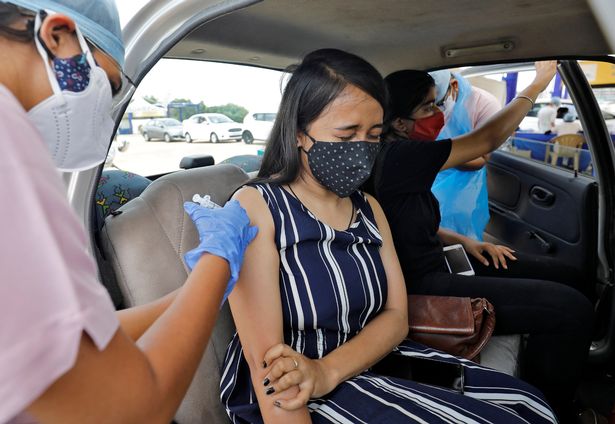A new strain of Covid has spread across three states in India with nearly two dozen ‘Delta plus’ cases detected.
And there are fears that the new strain of coronavirus could evade vaccines and pre-existing immunity to the disease.
In a press statement on the rising number of cases in the country, the Union Health Ministry on Tuesday said Delta Plus is now a ‘variant of concern.’
Previously, the ministry had only said it was a ‘variant of interest’.
The mutant strain has so far been found in 16 cases in the state of Maharashtra, Federal Health Secretary Rajesh Bhushan told a news conference.
The ministry said Delta plus showed increased transmissibility and advised states to increase their testing to combat its spread.

(Image: REUTERS)
The Economic Times reports that the mutation is from the Delta variant (B.1.617.2) which has shifted to form the Delta Plus (AY.1) variant.
Virologists are said to be looking to find out if this new variant may be able to evade pre-existing immunity better than either Delta or Beta.
Indian scientists said the strain had the same high transmissibility as the main Delta variant.
And they added it also carried the mutation K417N, first seen in the South African Beta variant, and which is believed to affect vaccine efficacy.
The Indian state health authorities had said last week that the newly identified variant could trigger a devastating third wave of Covid in the country.
The Delta strain of Covid, first identified in India, is currently the dominant strain in the UK and is 60 per cent more transmissible than the previous dominant strain, the Kent variant.
The UK government had come under criticism for not closing down flights from India early enough to prevent the variant reaching here.
The World Health Organisation said the Delta variant had been detected in more than 80 countries.
A devastating second wave during April and May overwhelmed health services in India, killing hundreds of thousands.
Images of funeral pyres blazing in car parks raised concerns over the chaotic vaccine rollout.
Since May, vaccinations have averaged fewer than 3 million doses a day, far less than the 10 million health officials say are crucial to protect the millions vulnerable to new surges.
The country vaccinated a record 8.6 million people as it began offering free shots to all adults to combat the spread of the virus.
The effort has so far covered about 5.5% of the 950 million people eligible, even though India is the world’s largest vaccine producer.


